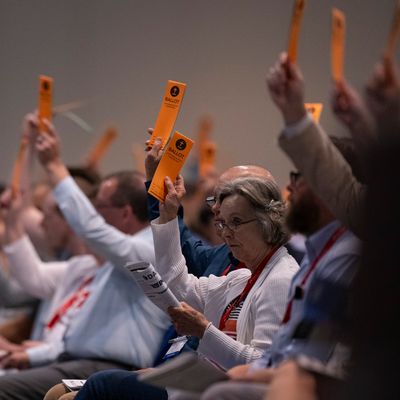

Southern Baptist Convention delegates voting on resolutions.
Photo: Doug McSchooler/AP
In the latest stage of a multi-decade radical conservative makeover of the once fiercely independent religious denomination, the annual meeting of the Southern Baptist Convention in Indianapolis adopted a resolution condemning the creation and destruction of embryos generally involved in IVF treatments. While it didn’t demand a strict ban on IVF, the resolution called on the denomination’s 13 million members to “advocate for the government to restrain actions inconsistent with the dignity and value of every human being, which necessarily includes frozen embryonic human beings,” while also encouraging infertile couples to find other ways to have children.
Thus, the nation’s largest Evangelical Protestant community placed itself firmly to the right of the conservative Republicans who have been stampeding to proclaim their love for IVF in the wake of an Alabama Supreme Court decision that ruled IVF clinics might be subject to wrongful-death liability for discarding embryonic “children” under the state’s radical anti-abortion laws. Indeed, the GOP legislature and governor of Alabama (right there in the Southern Baptist heartland) raced to enact a law to allow IVF clinics to continue treatments despite the grim court ruling. In addition, the very favorite politician of conservative Evangelicals, Donald Trump, said he would “strongly support the availability of IVF” as president.
So will the SBC resolution make a difference out there in the real world where laws are made and treatments are secured (generally at great cost and difficulty to the patients)? Politico’s Megan Messerly thinks so:
The move may signal the beginning of a broad turn on the right against IVF, an issue that many evangelicals, anti-abortion advocates and other social conservatives see as the “pro-life” movement’s next frontier — one they hope will eventually lead to restrictions, or outright bans, on IVF at the state and federal levels.
I don’t know about that. It’s not like the SBC delegates are pushing on an open door in attacking IVF as semi-homicidal. A Pew survey last month on IVF showed widespread support for IVF across all sorts of partisan, ideological, and religious lines. Republicans and Republican-leaning independents called access to IVF “a good thing” rather than “a bad thing” by a margin of 63 percent to 10 percent; Democrats and Democratic-leaning indies agreed by a margin of 79 percent to 5 percent. People who say they oppose allowing abortions “in most cases” backed IVF 60 percent to 11 percent; even those opposing abortion “in all cases” smiled on IVF by a two-to-one margin (40 percent to 20 percent). Most relevantly, white Evangelical Protestants, of which Southern Baptists are the largest single bloc, favored availability of IVF by a margin of 63 percent to 9 percent. That isn’t much of a base for a counterrevolution on this subject.
Perhaps it would be useful to look at the influence on this subject of another large religious denomination that has taken a hard line against IVF. The Roman Catholic Church, as noted by the National Catholic Register, has been clear about it: “The Catechism of the Catholic Church states that IVF is ‘morally unacceptable’ because it separates the marriage act from procreation and establishes ‘the domination of technology’ over human life.”
Now it’s well known that the Vatican’s opposition to “artificial” birth control based on the idea that it “separates the marriage act from procreation” is widely disregarded by the folks in the pews. But the recent Pew data suggest the church’s long-standing opposition to IVF isn’t cutting much ice either: Self-identified Catholics says IVF is “a good thing” rather than “a bad thing” by a margin of 65 percent to 8 percent.
According to Messerly, SBC opponents of IVF are playing the long game:
“It’s going to be a long process. It took us 50 years to take down Roe,” said Brent Leatherwood, president of the Ethics and Religious Liberty Commission, the public policy arm of the SBC. “It may take us a similarly long time frame to get people to a place where they are thinking more deeply about something like this. It’s okay. It takes time. We have to be patient.”
That’s one way of looking at the tides of history. Another is that the SBC itself has been engaged in a half-century devolution on reproductive rights since its 1971 resolution that “call[ed] upon Southern Baptists to work for legislation that will allow the possibility of abortion under such conditions as rape, incest, clear evidence of severe fetal deformity, and carefully ascertained evidence of the likelihood of damage to the emotional, mental, and physical health of the mother.” At some point, the gap between the denomination’s official pronouncements on IVF and lay opinion could create a backlash rather than a confirmation of views that contradict the widespread belief that IVF is about as “pro-family” a practice as can be imagined.
Source link




